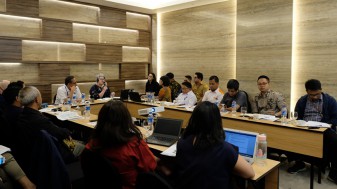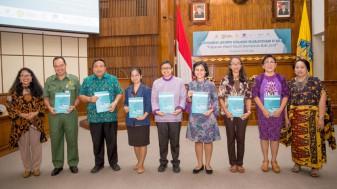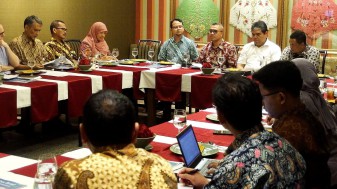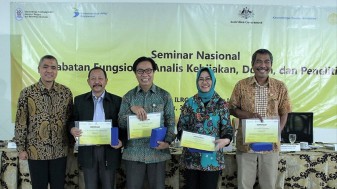The Center for the Study of Islam and Society (PPIM) Syarif Hidayatullah State Islamic University (UIN) is an autonomous research institution within the Syarif Hidayatullah State Islamic University Jakarta. Founded on 1 April 1995, this institution invites scholars from various disciplines and backgrounds to do research, study, conduct training and disseminate information about Indonesian Islam and Southeast Asian Islam. PPIM UIN Jakarta has a vision to become an institution capable of conducting intensive and sustainable research and studies on Islamic phenomena in Indonesia and Southeast Asia. For more than 26 years, in the academic and research world the role of PPIM UIN Jakarta has been recognised by the government and the public. Researchers such as Azyumardi Azra, Saiful Mujani, Hendro Prasetyo, Jamhari Makruf, Fuad Jabali, Jajat Burhanuddin, Ali Munhanif, Saiful Umam and Ismatu Ropi are prominent scholars who have contributed ideas and various knowledge products to the field of Islamic studies and society.
In the context of a knowledge-to-policy approach, one of the issues studied by PPIM UIN Jakarta is that of intolerance in Islamic education in Indonesia. Research and recommendations from PPIM UIN Jakarta on this issue were adopted by policy makers, including the Ministry of Education and Culture (Kemendikbud)[1] in 2020 and the National Education Standards Agency (BSNP) in 2021. To ensure the sustainability of its research, assessment and advocacy, PPIM UIN Jakarta took strategic steps to strengthen organisational and financial foundations. This was carried out with the support of the strategic partnership grant investment component of the Knowledge Sector Initiative (KSI).
Content on Tolerance
PPIM UIN Jakarta has been researching the issue of tolerance in Islamic education in Indonesia since 2016. In May 2019, PPIM UIN Jakarta began research on Islamic education competencies in collaboration with the Research and Development Agency (Balitbang) of the Ministry of Religion (Kemenag). This study found that Islamic education competencies did not yet adequately focus on promoting tolerance and respect for differences. With a paper and three policy summaries produced, PPIM UIN Jakarta presented its findings several times to the three agencies responsible for revising these competencies: the Directorate of Islamic Education (PAI) (Kemenag), the Center for Curriculum and Books (Puskurbuk) (Kemdikbud), and BSNP. Several recommendations from PPIM UIN's research on Islamic education competencies were adopted by Kemdikbud in the revision of competencies contained in the Decree (SK) of the Minister of Education and Culture Number 958/P/2020 concerning Learning Outcomes in Early Childhood Education, Elementary Education and Secondary Education, issued on 20 October 2020. Now, Islamic education competencies have specifically accommodated learning materials that promote tolerance and respect for differences.
Through studies related to the core curriculum and the basic curriculum of Islamic Religious Education, PPIM UIN Jakarta is also actively involved in the preparation of the Islamic Religious Education Learning Focus with BNSP. The two main recommendations put forward by PPIM UIN Jakarta were adopted in the guide, particularly for high school (SMA) Grades X to XII. This UIN PPIM recommendation was adopted in the focus document for Islamic Religious Learning, published by BSNP in February 2021. The two recommendations adopted include the point that students are expected to become religious people who are devout individually, are socially useful, and play an active role as citizens, as well as points about fostering an attitude of respect for differences in beliefs and identifying positive morals when interacting with people of different beliefs. With the adoption of recommendations from PPIM UIN Jakarta, the text of the focus on Islamic Religious Education Learning now has strong content on tolerance and fostering an attitude of respect for differences in beliefs and religions.
Sustainability
PPIM UIN's vision to become an institution capable of conducting intensive and sustainable research and studies on Islamic phenomena in Indonesia and Southeast Asia needs to be supported. PPIM UIN Jakarta has taken a number of strategic steps to strengthen the organisational and financial foundations for sustainability, and the realisation of the institution's vision and mission. One of them is to annually update the Human Resource Risk Management Plan. This update is carried out by identifying the strengths and weaknesses of resource management and its development, opportunities and needs for researchers' resources, analysis of researchers' positions, and developing technical guidelines for the implementation of a recruitment, selection and training needs analysis.
To support the regeneration process and strengthen the capacity of researchers, PPIM UIN Jakarta makes plans for research resources, especially in the research association section (pool of researchers). It does this by identifying the number of active researchers, expertise/study, and research interests to be aligned with the needs of PPIM UIN Jakarta. Analysis of the training needs of each researcher is also carried out by identifying the gap between the competencies possessed and the competencies expected in their positions. PPIM UIN Jakarta then prepares modules for training materials and research capacity building and prepares the recruitment and selection process to prepare for the regeneration of researchers.
In strengthening the financial foundations, PPIM UIN Jakarta seeks to increase the capacity of research resources with adequate competence and qualifications to be involved in the business development of PPIM UIN Jakarta. This is done, among others, through training on the capacity of young researchers at PPIM UIN Jakarta, a cadre of new research candidates and the establishment of a research hub for young lecturers at UIN. By taking these strengthening steps, PPIM UIN Jakarta targets increasing the variety and amount of funding from both domestic and foreign sources, as the foundation for the sustainability of research and advocacy of PPIM UIN Jakarta in the field of Islamic studies and society.
KSI's Contribution
Funding from KSI enabled PPIM UIN Jakarta to conduct research and advocacy on the issue of intolerance in Islamic education in Indonesia for several years. It also helped build awareness of PPIM UIN Jakarta about the importance of involving policy makers to ensure research findings are known by policy makers, so that they can influence policy. Through KSI's support, PPIM UIN Jakarta strengthened stakeholder engagement and drove them to conduct joint research with the Ministry of Religion's Research and Development Centre (Balitbang). They also involved other agencies relevant to this process. KSI's contribution also strengthened the organisational and financial foundations of PPIM UIN Jakarta to help realise its vision and mission in a sustainable manner. This was achieved through the support of an investment component that enabled PPIM UIN Jakarta to increase human resource capacity and the organisation's financial management skills.
[1]Now the Ministry of Education, Culture, Research and Technology (Kemendikbudristek).






